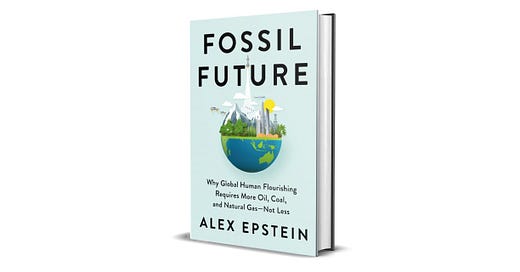Senator Barbara Boxer: Mr. Epstein, are you a scientist?
Alex Epstein: No, philosopher.
Senator Barbara Boxer: You’re a philosopher?
Alex Epstein: Yes.
Senator Barbara Boxer: Okay. Well, this is the Senate Environment and Public Works Committee. I think it’s interesting we have a philosopher here talking about an issue…
Alex Epstein: It’s to teach you how to think more clearly.
In 2020, the U.S. contained about 11,000 climatologists. Which means that over 99.99% of Americans are not climatologists. Needless to say, it’s a complex subject. Unlike most complex subjects, however, climatology stands at the heart of decades of debate about replacing fossil fuels. How are the 99.99%+ of laymen to figure out what’s going on?
The cliched answer is just: “Trust the science.” What are you supposed to do, though, if scientists disagree? The answer, presumably, is: “Trust the scientific consensus.” Most of us, however, also lack any first-hand knowledge of what the climatological consensus is. In practice, therefore, “Trust the science” amounts to “Trust what the media, activists, and politicians say about the science” and “Trust the scientific consensus” amounts to “Trust what the media, activists, and politicians say about the scientific consensus.”
Needless to say, trusting the media, activists, and politicians sounds a lot less prudent than trusting “the science” or even “the scientific consensus.” Either way, though, it all boils down to credibility. What is the best way to decide who to trust when you lack the competence to assess the evidence directly?
While Alex Epstein’s Fossil Future presents a lot evidence, one of its major goals is to enhance readers’ ability to assess credibility. Indeed, Fossil Future is one of the most meta books I’ve ever read. He points out, for example, that when we decide how much to trust a source, we should check whether it omits big blatant relevant facts.
One way to spot when syntheses are going very wrong is to look for crucial variables or facts that are being omitted from a synthesis. For example, we can look at whether a synthesis of nutrition endorsing one specific diet (whether vegan or ketogenic) is ignoring the existence of healthy populations who don’t follow the endorsed diet.
For fossil fuels and climate change, one big blatant relevant fact is overall climate deaths:
If we look for variables omitted by the IPCC, the central body invoked by the moral case for eliminating fossil fuels, we find a major one: the death rate from climate- related disasters over time. The death rate from climate-related disasters, especially over the last one-hundred-plus years as CO2 levels have risen, tells us an enormous amount about humans’ ability to adapt to or master climate danger — which will tell us a lot about which potential climate changes would and wouldn’t be serious problems.
And yet, if you go through the multi-thousand- page IPCC synthesis reports, you will not find any quantification of climate- related disaster deaths…
Whatever the IPCC’s motives for omitting the fact of plummeting climate-related disaster deaths, one thing is certain: when the world’s most influential synthesizing institution does not include a crucial variable, what we are told the “experts” think is inevitably and significantly distorted.
Another omitted big blatant relevant fact is the benefits of fossil fuels:
A knowledge system rationally evaluating policy options would not discuss the idea of restricting, let alone eliminating, fossil fuel use without stressing that (1) fossil fuels are currently a uniquely cost-effective source of energy, (2) cost-effective energy is essential to human flourishing, and (3) billions of people are suffering and dying for lack of cost-effective energy.
The fact that our knowledge system routinely calls for fossil fuel elimination while ignoring all three of these undeniable benefits suggests that this is one of those times in history where the knowledge system’s “expert” evaluation involves an egregiously irrational method of evaluation — in this case, calling for the elimination of something while ignoring its massive, life-or-death benefits.
Epstein continues:
As disturbing as I found our knowledge system’s support of fossil fuel elimination while ignoring fossil fuels’ benefits, it at least had an apparently healthy motivation: the desire to avoid at all costs fossil fuels’ CO2 emissions, which our knowledge system says will cause catastrophic or even apocalyptic consequences.
But this interpretation is contradicted by the fact that our knowledge system, including our designated experts, regularly supports the elimination of the two most cost-effective, non-CO2-emitting alternatives to fossil fuels — alternatives you would expect anyone concerned about CO2 to eagerly champion: nuclear energy and hydroelectric energy.
Your track record is another key indicator of credibility. The more accurate your past predictions were, the more accurate we should expect your future predictions to be:
While it is hard to directly assess the validity of our knowledge system’s predictions about the future of climate, it is both far easier and highly informative to assess our knowledge system’s, including designated experts’, track record of climate prediction.
The track record of an institution or person tells us a lot about how good their thinking methods are, especially how good their predictions are, and how much they deserve to be relied upon today.
By this measure, Epstein says that the world’s top alarmists have low credibility indeed:
I want to emphasize that wildly overstated public climate predictions were not made by most climate researchers but by designated experts — those that the knowledge system relied on as spokespeople for all climate researchers. Many researchers made more accurate predictions — or argued that accurate prediction was impossible. But those researchers were largely ignored in favor of those who made extreme negative predictions — a phenomenon we will see repeat itself over and over.
Yet another sign of low credibility is hostility to obvious solutions:
When you are talking about replacing the world’s only source of ultra-cost-effective energy with alternatives, you want all alternatives at your disposal.
And yet today’s calls for replacing fossil fuels insist on just “green” or “renewable” alternatives, which usually exclude most hydroelectric energy as well as nuclear energy— the only form of raw energy that combines the natural storage, natural concentration, and natural abundance that characterize fossil fuels.
Even if you think that solar and wind are super-promising, there is no reason whatsoever to be hostile to nuclear — and yet today’s movement to “replace” fossil fuels with green energy is incredibly hostile to nuclear.
And don’t forget the classic sign of low credibility: deliberate deceit. While every viewpoint has deceptive advocates, Epstein shows that some of the leading arguments against fossil fuels are deeply deceitful. Starting with the “97% of climate scientists agree”:
Consider the use of the “97 percent” refrain by current climate envoy and former secretary of state John Kerry in a landmark speech discouraging the people of Indonesia from using fossil fuels — even though they have experienced a major increase in prosperity driven by increasing use of fossil fuels:
“The science of climate change is leaping out at us like a scene from a 3D movie. It’s warning us; it’s compelling us to act. And let there be no doubt in anybody’s mind that the science is absolutely certain. It’s something that we understand with absolute assurance of the veracity of that science... Well, 97 percent of climate scientists have confirmed that climate change is happening and that human activity is responsible. These scientists agree on the causes of these changes and they agree on the potential effects... They agree that, if we continue to go down the same path that we are going down today, the world as we know it will change — and it will change dramatically for the worse.”
Note how Kerry goes from “97 percent of climate scientists have confirmed that climate change is happening and that human activity is responsible” to “they agree that, if we continue to go down the same path that we are going down today, the world as we know it will change — and it will change dramatically for the worse.”
Kerry is pulling a bait and switch — using agreement about some climate impact from rising CO2 levels to gain false authority for his claim of massively negative climate impact from rising CO2 levels…
Flipping the issue around, Epstein presents the following signs of high credibility:
1. They give clear explanations of the evidence for their views rather than just invoking authority.
2. They are precise — not sloppy — with terminology, magnitudes, and probabilities.
3. They distinguish degrees of known and unknown — in their field and for themselves personally.
4. They legitimately engage and address competing viewpoints, without evading, demonizing, or straw-manning them.
Couldn’t critics fairly accuse Epstein himself of “demonizing” competing viewpoints? You could definitely argue that he demonizes a few individuals based on their actual words and behavior. But the issue, as I think Epstein would agree, is whether you treat disagreement itself as strong evidence of sin. And he really doesn’t. Indeed, he goes out of his way to admit that he spent years under the spell of the mainstream view. With complete absence of malice:
One of the challenges of performing a full-context evaluation of continuing fossil fuel use was that I myself had been immersed in the mainstream knowledge system my whole life and therefore had been immersed in the anti-impact framework. On many occasions I have found myself inadvertently operating on the anti-impact framework…
You might respond, “So Epstein doesn’t demonize himself. But who does?” A lot of folks, actually. “I was once a sinner like you” is a convert’s cliche. But instead of saying this, Epstein happily admits that “anti-impact framework” is a mental trap that’s easy to spring but hard to escape.
P.S. Expect light posting until January. I fly to LA tomorrow, then continue on to Japan shortly thereafter. Looking forward to meeting lots of readers on my journey!
Subscribe to Bet On It
Caplan and Candor

















Bryan, I'm just curious if you think it is possible that Alex might be going overboard in his position. I'm a former DOE Global Change Fellow, and I've been deep in the weeds of this discussion.
I've seriously taken climate activists to task, most recently in Losing My Religions. https://www.losingmyreligions.net/
I've also blogged in favor of some of Alex's ideas, and the importance of development for climate adaptation.
But it seems clear to me that there will be a lot of *suffering* caused by climate change, if only because we have so much poverty in the world right now. There will be many more climate refugees, and that will further stress the West.
I think we should be much more broadly balanced in our discussion, rather than just attacking one side as "wrong" or "flawed" or "anti-science."
As with anything else, one should ask "Compared to what?" Are there other areas of widely accepted and impactful scientific discourse that Epstein thinks do a lot better than climate science? If so, can he point to some to emulate? If not, does he discount publicly expressed consensus in other areas of science as much as climate science?